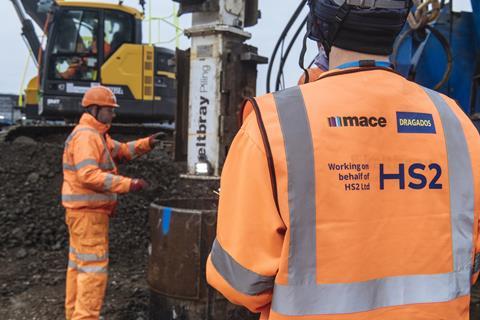Infrastructure lobby says fall in new work is consequence of cuts
A 5% fall in new work saw output drop 1.3% in the final quarter of 2023, according to the Office for National Statistics (ONS).
The Q4 (October to December) fall against the previous quarter was not offset by a 4% rise in repair and maintenance work.

More broadly, UK GDP shrank by 0.3% in the final quarter, following a 0.1% drop in the previous quarter, meaning the economy has entered a technical recession.
Monthly output in December was also down 0.5%, once again coming solely from a decline in new work – three out of the nine sectors saw a fall in the monthly, with infrastructure new work the biggest contributor (-6.4%).
A statement from the Civil Engineering Contractors Association said the news that the news of recession showed that “cuts have consequences”.
Marie-Claude Hemming, director of operations at CECA, said: “Last year, Prime Minister Rishi Sunak pledged to grow the economy, while at the same time putting the brakes on infrastructure spending - not least with the catastrophic decision to axe the second leg of HS2”.
She said failing to back construction and infrastructure would “always feed through to a decline in growth” and called on all parties to adopt a “sustainable and positive” approach to infrastructure that prioritises long-term investment in projects and skills.
New orders data showed all sectors, with the exception of public housing, contracting at an accelerating rate.
Private industrial new order fell 52% year-on-year for the fourth quarter after a prolonged boom since 2020, while private housebuilding also dropped 24% year-on-year.
>> Recession dos and don’ts: Industry leaders’ advice on keeping afloat
>> UK housebuilding recession: How much worse is it going to get?
“2023 ended with a distinct uptick in investment sentiment but this hasn’t converted into new business for construction yet,” said Arcadis partner Simon Rawlinson, who noted that the order book data contrasted with recent signs of optimism from housebuilders and PMI data.
“2024 is likely to be a tough year as builders struggle to turn scarce opportunities into work on the ground,” he added.
Glenigan chief executive Russell Haworth put a brighter spin on the prospects for 2024, noting that his firm’s own data predicted 8% growth for the construction sector in the latter half of this year.
“I want to remind those in the industry that although conditions remain tough for now, firm development pipelines are already pulling through to support a rise in non-residential verticals such as industrial and offices,” he said.
“Similarly, improved household spending is expected to lift activity in consumer-related verticals, including private housing and retail.
“Hang in there, and there will be opportunities for hungry and agile contractors to target these growing markets and finish the year on top.”
Mike Hedges, company operations director at Beard, said inflation remained “a key barrier to growth” but said an “improving outlook for both the economy and the market has encouraged many to commence with work”.



























No comments yet